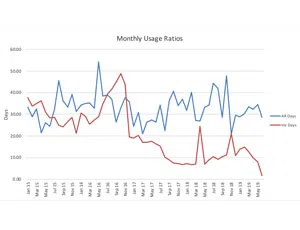Every economic downturn brings with it a restructuring. Change is a natural outcome of turbulent times. The number one challenge for every manager or business owner today is to understand how the needs, requirements, and expectations of customers have changed.
The classic approach to this is the outside-in perspective — looking at or viewing your company through the eyes of the customer. But in good times as well as very turbulent times, it’s easier and more common for an organization to look at itself from the inside-out, little by little turning off the listening devices that brought initial success by helping to identify the needs, requirements, and expectations of customers.
Peter Drucker, the famous management consultant, maintained that managers get imprisoned by their own organizations, and — cut off from direct customer contact and feedback — lose perspective and become ineffective. They end up spending their days responding to whichever phone call or emergency hits their desk next. Economic downturns accelerate the firefighting mentality and often dampen the overall morale of the organization.
Companies that will lead the market as it returns to better economic times will do so by putting the fundamentals of outside-in principles to good use. Here’s a brief rundown of Drucker’s eight business realities that can help organizations obtain superior results in good and turbulent times. For a full description of these practices and other useful Drucker insights, see Inside Drucker’s Brain, by Jeffery A. Krames, published by Penguin Group Inc. It’s available on Amazon.com. Results and resources exist outside the business.
Results never depend on anyone within the company. They rely on customers in the marketplace. “It’s always somebody outside who decides whether the efforts of a business become economic results or whether they become so much waste and scrap.”
Results are achieved by exploiting opportunities, not solving internal problems. Solving problems can only return the organization to its prior status quo. To achieve results, managers must exploit opportunities and avoid the trap of spending most of their time putting out fires. The organization’s best people need to spend their time searching for new opportunities.
To obtain results, resources must be allocated to opportunities. Too often, major resources are wasted on fixing problems. Effectiveness is the business driver, not efficiency. The key, according to Drucker, is not how to do things right, but how to do the right things. This concept is reflected in his definition of leadership. Leadership, he said, is doing the right things; management is doing things right.
The most meaningful results go to market leaders. “A company which wants economic results has to have leadership in something of real value to a customer or marketplace.” Profits are the rewards from delivering something the marketplace accepts as value.
Leadership is shortlived and not likely to last. Market leadership is temporary. “Business tends to shift from leadership to mediocrity. Managers must reverse the trend toward mediocrity by providing new energy and a new direction.”
What exists is getting old. Drucker maintained that managers “spend more of their time trying to unmake the past than anything else.” Today’s winning products and services are part of yesterday. The trap most managers fall into is working on yesterday. The danger is that “just as generals tend to prepare for the last war, businessmen always tend to react in terms of the last boom or the last depression.”
What exists is likely to be misallocated. The 80/20 rule is more like 90/10, according to Drucker. The first 10% of effort in a firm produces 90% of the results. The key is to make sure that your best people and your best resources are allocated to projects or products with the potential to deliver tomorrow’s business.
To achieve the greatest economic results, concentrate. Don’t dabble in too many things. Learn to focus efforts on the key products, services, and customers that will make a difference.
In The Effective Executive, Drucker maintained that too many organizations become shortsighted and insular because they do not spend enough time in the marketplace, which he called “the only place that matters.” Developing an outside-in perspective isn’t easy. But, in times of major and turbulent economic change, it offers important organizational guidelines for survival and prosperity.






